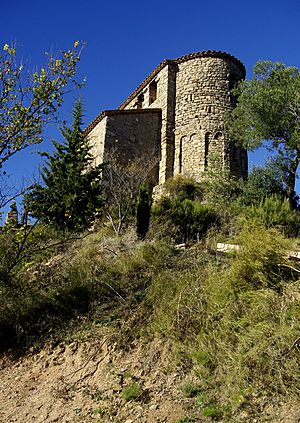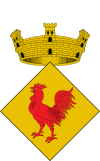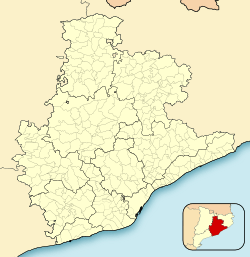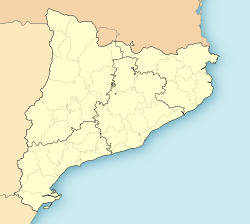Gallifa facts for kids
Quick facts for kids
Gallifa
|
|||
|---|---|---|---|
|
Municipality
|
|||

The castle became a church
|
|||
|
|||
| Country | |||
| Autonomous community | |||
| Province | Barcelona | ||
| Comarca | Vallès Occidental | ||
| Area | |||
| • Total | 16.3 km2 (6.3 sq mi) | ||
| Elevation | 502 m (1,647 ft) | ||
| Population
(2018)
|
|||
| • Total | 169 | ||
| • Density | 10.37/km2 (26.85/sq mi) | ||
| Postal code |
08146
|
||
Gallifa is a small and charming municipality in the comarca of the Vallès Occidental in Catalonia, north-eastern Spain. A municipality is like a town or district with its own local government. A comarca is a traditional region in Catalonia.
Gallifa is known for its historic Castle of Gallifa. It was also home to the studio of a famous ceramic artist, Josep Llorens i Artigas, and his son. Many amazing artworks were created here.
Contents
Gallifa's Famous Castle
The Castle of Gallifa is a very old building. It stands high above the village, at about 600 meters (nearly 2,000 feet) tall. From the castle, you can see amazing views of the area. Over time, parts of the castle were changed into a church.
Artistic Creations in Gallifa
Gallifa became a special place for art. In 1953, two very famous artists worked together here. They were Joan Miró, a world-renowned painter, and Josep Llorens i Artigas, the ceramic artist.
Working with Fire and Clay
Miró and Artigas worked at Artigas's studio in Gallifa. They created unique art pieces called "firestones." These were special ceramic sculptures. They showed their joint artworks in exhibitions, including one in New York in 1956.
Murals for the World
The next year, in 1957, the two artists started big projects. They worked on a huge mural for the UNESCO headquarters in Paris. UNESCO is an organization that promotes peace and culture. They also made a mural for the University of Harvard in the United States.
The ceramic tiles for the UNESCO murals were made in Gallifa. Miró himself went to Paris to watch them being put up. These famous murals are called "The Wall of the Sun" and "The Wall of the Moon."
Long Journey of Art
Another large ceramic mural by Joan Miró, known as the Miró Wall, was also made in Gallifa. The tiles for this mural had a very long journey. They traveled 1,200 kilometers (about 745 miles) to the Ludwigshafen museum in Germany.
To move the tiles, they were placed four to a box. Mules carried them down the mountain from Gallifa. After that, lorries (trucks) and trains took them the rest of the way. This shows how much effort went into creating and moving these incredible artworks.
See also
 In Spanish: Gallifa para niños
In Spanish: Gallifa para niños
 | Audre Lorde |
 | John Berry Meachum |
 | Ferdinand Lee Barnett |






